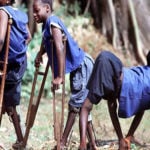The Nigeria Centre for Disease Control(NCDC), has partnered with Coalition for Epidemic Preparedness Innovations(CEPI) to develop and manufacture the Lassa fever vaccine by 2030.
At a 3-day workshop, the conclusion of the 18th-month infection cohort follow-up, to discuss the progress of research termed “the Enable Lassa Research Programme” brought together scientists from Nigeria, Benin, Guinea, Liberia and Sierra Leone affected by Lassa fever to share progress, challenges and insights from their work.
Speaking to journalists at the end of the workshop, the National Coordinator of CEPI Enable Study in Nigeria, Professor Bola Olayinka, explained that the study is supposed to let experts understand the burden of the disease in the country, whether it affects adults more than children and for those that are affected what really happens to them.
“It’s also to let us know how many people have been exposed to Lassa fever. We’re hoping that the outcome of this study, will help us to know a number of fields.”
Speaking further, Olayinka said, “there have been a lot of messages on how to prevent Lassa fever because it’s transmitted by contact with rats, either their blood or the faeces or the urine when they do it into food, especially when food is left uncovered.
“So there’s been all that information that people should avoid and keep their foods protected, ensured that they prevent rats from having access into the rooms so that people do not get Lassa fever.
“This study is also supposed to help those who are developing vaccines to be able to develop a vaccine that is safe against a fever and that will prevent and protect a lot of Nigerians and others from contacting Lassa fever,” She added.
Adeyinka maintained Nigeria is not currently directly involved in the development of vaccines as in, maybe not doing it at the industry level.
“But the importance of this study is that we are contributing to the information that they need, that the world needs to develop an effective vaccine. Nigeria is critical because if you look at the world, we have the highest number of Lassa fever cases worldwide.
“So if they need answers from anywhere in the world, the answer really needs to come from us, and so that’s the importance of what we’re doing here today.
“Hopefully, we’ll get a vaccine before 2030. And the reason is there are already some vaccine candidates that have been developed.
“It’s just that those vaccines need to go through what we call trials. Our trials are these studies that check how safe and how effective, the vaccine is, and Nigeria is meant to be a part of this country WHO have the countries that will do this trial.
“Once we can determine that the vaccines are safe and effective. And then we’ll have an available Lassa fever vaccine to protect the lives of many,” Adeyinka said.
Director of Epidemiology, CEPI, Gabrielle Breugelmans, also announced that they were working towards having a licensed Lassa fever vaccine for Nigeria by 2030
Breugelmans said one critical component of the “Enable Study” was not just the development of vaccines, but the deployment and acceptability of those vaccines by the community.
“Enable Study is also strengthening local capacities and manufacturers for African countries to be self-reliant in vaccine production,” she said.
On her part, the Incident Manager Nigeria Centre for Disease Control and Prevention, Chioma Dan-Nwafor said the research tries to look at the mode of transmission to the chain of transmission
According to Nwafor, “If we can better understand this that way we can be able to implement infection prevention and control measures.
“When it comes to your research, I mean there is really a whole lot we can’t wait for the outcome of the result of the study because that will inform clinical trials for vaccine not just the vaccine also it’s therapeutic as you’re aware there is no approved vaccine for Lassa and there’s also no clear medication or drug for the treatment of Lassa fever.”
Also the chairman of the Presidential Steering Committee for West Africa Enable Study, N’Faly Magassouba noted that this was the opportunity for CEPI to develop the largest epidemiological study ever performed in West Africa.
He said more than 25,000 participants are taking part in the main challenges in community engagement.
“First, go to the community and make them understand that this is a public health problem for the country because is neglected but deadly.
“For example in Guinea last year in 2021. We identified certain cases and we lost 661 Because we don’t have the answer to what is necessary to take to manage these cases.
“The second one was of course, defensive we have a country that has 5000 participants to manage. It is not easy, but with 108 villages to go everywhere, collect the samples, make 10 and treatment centre logistics but thanks to CEPI and the support partner, we are able to face the challenges,” He said.
ALSO READ FROM NIGERIAN TRIBUNE






